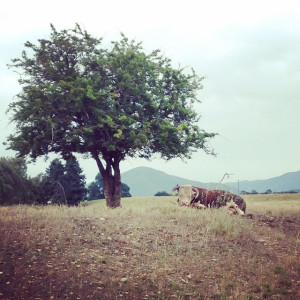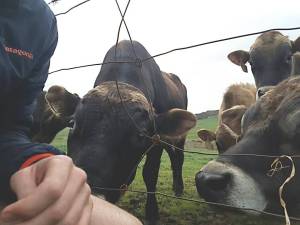A guest post from NOI-friend, Dave Moen …
To the farm
I am a physiotherapist and dabble a bit with research. This combination started feeling a bit high-horsed, so to keep myself honest I took some part-time work on a farm. And gee whiz, it’s been bloody excellent! Crunching frost and foggy sunrise. Wet boots. Deep satisfaction from cups of tea. At smoko’ on the third day my opportunistic farming friends got to the point. If it was going to be good for me to holiday at the farm, it was going to be good for them to have an on-site physio.
“My back’s rooted mate, and John’s knees are pretty fucked from footy. Sam fell off a motorbike a few years ago, and the bloke said it was lucky he didn’t lose his leg (and so on and so on).”
To them, the problem was simple: unhealed injuries, cumulative damage from years of work in the field, bodies wearing out. Increasing pain was proof that the damage was getting worse, and eventually they would be so damaged they would have to stop.
Picture this! I’ve come from treating chronically painful sedentary folk, made pale from air-conditioned years spent under fluorescent light. My clientele of office workers have “drive to Perth pain”, or the pain an average human might have if they sat for 3 three days in a car (just they’ve been sitting for 20 years!). In this population, movement is the best medicine. But the men in the field were active and strong! In their eyes, they had too much movement. So what is the most biologically plausible explanation for their pain? It is a tough question, and I am confident that no one can confidently answer it. That being said, we are reasonably sure that the worsening pain equals worsening injury model is probably not it. One bloke asked me about treatment for his back.
Option 1 (current best practice)
Drawing from the imprecision hypothesis, we might wonder whether tissue signals for load have been classically conditioned to evoke pain. If this were the case then an intervention like dead lifting would be top stuff! Give a dose of REAL load in a therapeutically useful context and we might be able to re-condition and normalise load processing. Deliver this with lots of effective reassurance and Explain Pain education, and it looks like we’re improving self-efficacy as well.
Option 2 (what actually happened)
The next day Andy said, ‘my back hurts’. Will (the therapist) replies, ‘I guarantee that I can make it better. Put you palms in your eye sockets and hold your elbows together at the front, I’ll crack your back mate’. Andy accepts. Will cracks Andy’s back, he gets four levels! Andy’s back feels immediately better. But tomorrow Andy’s back is sore again.
The (a)moral of the story
Short-term wins like Andy’s are attractive, but the evidence shows they don’t stick. Until we band together as a medical profession and integrate the biology of pain into our treatment justification, consumers will stay confused by the competing opinions of various sects of our profession. I think it’s good to have diversity, and people have a right to choose their treatment approach. But at the same time we have a professional and ethical obligation to do best practice. Pain has a new story, and the science is too clear to discount it.
– Dave Moen
David Moen is a physiotherapist with some wonderfully amazing, forward thinking methods of treating chronic pain. This cycling-enthusiast, barista-extraordinaire, can be found at his Adelaide-based practice, Form Physiotherapy, or alternatively (as the story tells) keeping it real in Adelaide farm lands.
LAST CHANCE TO GET ON AN AUSTRALIAN EXPLAIN PAIN OR GRADED MOTOR IMAGERY COURSE WITH DAVID BUTLER FOR 2016

Gold Coast 30 September – 2 October Explain Pain and Graded Motor Imagery **FULL**
Perth 15 – 17 October Explain Pain and Graded Motor Imagery
HAVE YOU DOWNLOADED OUR NEW PROTECTOMETER APP YET?

Just search the App Store from your iPad for ‘Protectometer’
WE’RE PACKING UP EP3 AND TAKING IN ON THE ROAD IN THE USA

EP3 events have sold out three years running in Australia, and we are super excited to be bringing this unique format to the United States in late 2016 with Lorimer Moseley, Mark Jensen, David Butler, and few NOI surprises.
EP3 EAST Philadelphia, December 2, 3, 4 2016
EP3 WEST Seattle, December 9, 10, 11 2016
To register your interest, contact NOI USA:
p (610) 664-4465
e noius@noigroup.com



Dave, fortunately for Andy the “imprecision” hypothesis floundered due to a decided lack of scientific evidence. From my personal experience over many years running country rheumatology clinics, Will is most likely to have been a highly regarded fly-in/fly-out chiropractor.